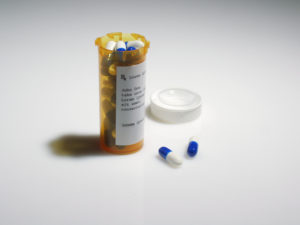You Should Know What Each One Of Your Drugs Is Prescribed For, And Its Potential Side Effects
Do You Know What You Should Know?
 One of the most important things you can do to improve your health is to become proactive. I strongly encourage you to become an informed patient. You should know what drugs you are taking, what they are for, what their potential side effects are (chances are you are experiencing or will eventually experience their side effects), and that there are often natural options available. Drugs can be life saving but can also cause life draining side effects. Too many patients are taking drugs that actually make them feel worse. often leading to taking additional drugs to cover up the side effects triggered by another drug. Drugs are designed to treat symptoms, not causes. One of cause of high blood pressure is being overweight, same for type II diabetes. Losing weight is the answer. I always recommend treating cause, not symptoms-short term treating symptoms is fine, long term it is like robbing Peter to pay Paul.
One of the most important things you can do to improve your health is to become proactive. I strongly encourage you to become an informed patient. You should know what drugs you are taking, what they are for, what their potential side effects are (chances are you are experiencing or will eventually experience their side effects), and that there are often natural options available. Drugs can be life saving but can also cause life draining side effects. Too many patients are taking drugs that actually make them feel worse. often leading to taking additional drugs to cover up the side effects triggered by another drug. Drugs are designed to treat symptoms, not causes. One of cause of high blood pressure is being overweight, same for type II diabetes. Losing weight is the answer. I always recommend treating cause, not symptoms-short term treating symptoms is fine, long term it is like robbing Peter to pay Paul.
I recommend using www.rxisk.org or http://www.mayoclinic.org/drugs-supplements/drug-list to research your meds.
What You Need To Know About Your Drugs
 Nsaids
Nsaids
Nonsteroidal anti-inflammatory drugs (NSAIDs) can be helpful, especially when used for inflammation that comes from traumatic injuries (sprains, strains, accidents, etc.). They can also be effective in relieving pain and inflammation associated with chronic pain syndromes including all forms of arthritis and even some cases of FMS. However, long-term use of these medications can cause a host of unwanted side effects, and NSAIDs do not actually correct the cause of pain. In fact, they can accelerate joint destruction and cause intestinal permeability, which leads to more inflammation.
You might have heard of how drug company Merck pulled its NSAID Vioxx off the market. They were responding to the results of a long-term (18-month) clinical trial that revealed that some patients developed serious heart problems while taking the drug. The data that ultimately persuaded the company to withdraw the drug indicated 15 cases of heart attack, stroke, or blood clots per thousand people each year over three years, compared with 7.5 such events per thousand patients taking a placebo.
One of the FDA’s own scientists, Dr. David Graham, estimated that Vioxx has been associated with more than 27,000 heart attacks or deaths linked to cardiac problems. There is disagreement within the FDA over these findings, but they are still staggering to consider.
Potential side effects of drugs like Vioxx
 Vioxx is what doctors call a “COX-2 inhibitor.” These drugs were developed to reduce pain and inflammation without the risk of ulcers and other — potentially deadly — gastrointestinal side effects posed by aspirin and similar medications. But in solving one serious problem, COX-2 inhibitors might be causing another. By blocking COX-2 enzymes, Vioxx reduced the risk of internal bleeding but also kept COX-2 enzymes from doing the important work of counteracting COX-1 enzymes, which narrow the blood vessels. The blood vessels were then remaining too narrow, increasing the chances of a dangerous blood clot forming.
Vioxx is what doctors call a “COX-2 inhibitor.” These drugs were developed to reduce pain and inflammation without the risk of ulcers and other — potentially deadly — gastrointestinal side effects posed by aspirin and similar medications. But in solving one serious problem, COX-2 inhibitors might be causing another. By blocking COX-2 enzymes, Vioxx reduced the risk of internal bleeding but also kept COX-2 enzymes from doing the important work of counteracting COX-1 enzymes, which narrow the blood vessels. The blood vessels were then remaining too narrow, increasing the chances of a dangerous blood clot forming.
Other COX-2 inhibitors, including Celebrex and Bextra, are being linked to an increased risk of heart attack and stroke. It may be a matter of time before all COX-2 inhibitor drugs are pulled from the market. And the really sad news is that although Vioxx did apparently protect the stomach as intended, other COX-2 inhibitors do not. Celebrex and Bextra have turned out to be no safer to the stomach than older NSAIDs. And studies show that neither drug alleviates pain any better than the older medicines.
Plus, the COX-2 inhibitors cost close to $3.00 per pill. Over-the-counter pain relievers, in contrast, cost pennies a dose. Other NSAIDs are safer than COX-2 inhibitors. These include Mobic (meloxicam), Motrin (ibuprofen), Daypro (oxaprozin), and Naprosyn (naproxen). But still, unless nothing else works to control your pain, NSAIDs shouldn’t be used for any extended period of time.
Potential side effects of other NSAIDS
A person taking NSAIDs is seven times more likely to be hospitalized for gastrointestinal adverse effects. The FDA estimates that 200,000 cases of gastric bleeding occur annually and that this leads to 10,000 to 20,000 deaths each year. NSAIDs more than double a person’s risk of developing high blood pressure, possibly leading to more medication. In one study, 41% of those who had recently started on medication to lower their blood pressure were also taking an NSAID.
 Narcotic Analgesics
Narcotic Analgesics
These pain-relieving medications, which act on the central nervous system, are extremely effective in relieving acute and chronic pain. Unfortunately, they eventually lose their effectiveness as your body becomes “tolerant” of them. If these analgesics worked long-term, I’d be recommending them. However, the person taking these medications finds that she has to take an ever-increasing dose to get any relief. Before she knows it, her body is addicted to a potentially life-threatening drug. Typically, another drug or additional drugs are then tried, and the process continues until the person becomes zapped of her vitality, living hour to hour in accordance with her medication schedule.
Narcotic analgesics include Ultram (tramadol), Lortab (hydrocodone), Darvocet (propoxyphene and acetaminophen), the Duragesic patch (fentanyl), Percocet (oxycodone and acetaminophen), Vicodin (hydrocodone and acetaminophen), Zerlor (dihydrocodeine, acetaminophen, and caffeine), and others. Ultram, which is less addictive, has been considered the best choice for those with FMS if a narcotic pain medication is truly necessary. However, many are not recommending Ultram due to its risk for causing seizures. Taking Ultram along with SSRI antidepressants increases the risk.
Other side effects include:
Cold, clammy skin; severe confusion; convulsions; diarrhea; severe dizziness; severe drowsiness; increased sweating; low blood pressure; nausea or vomiting; severe nervousness or restlessness; pinpoint pupils in the eyes; difficulty breathing; slow heartbeat; stomach cramps or pain; and severe weakness. These can happen to either you or any baby you are breastfeeding. More rare side effects include hallucinations, severe swelling in the face, and unusual bruising and/or bleeding.
Withdrawing from these medications can be a traumatic experience in itself, especially after your body has begun to build up a tolerance and expects to keep getting the drug. When the drug treatment stops, you could experience body aches; diarrhea; a fast heartbeat; a fever, runny nose, or sneezing; nausea or vomiting, nervousness or irritability; shivering or trembling; stomach cramps; trouble sleeping; or weakness, among other symptoms.
Sleep Aids
 Ambien (zolpidem) has been a very popular prescription medications in the United States. Lunesta (eszopiclone) is a similar sleep aid. Both are short-acting, designed to last four–six hours. If a patient takes a half-dose before bed, then he can take an additional half-dose if needed in the middle of the night. The newer Ambien CR tries to avoid this midnight redosing, however, by including a slower-release layer designed to last all night. Even though the literature on Ambien suggests that most patients don’t build up a tolerance, many do. But other patients do well on Ambien, and it does promote DEEP RESTORATIVE SLEEP.
Ambien (zolpidem) has been a very popular prescription medications in the United States. Lunesta (eszopiclone) is a similar sleep aid. Both are short-acting, designed to last four–six hours. If a patient takes a half-dose before bed, then he can take an additional half-dose if needed in the middle of the night. The newer Ambien CR tries to avoid this midnight redosing, however, by including a slower-release layer designed to last all night. Even though the literature on Ambien suggests that most patients don’t build up a tolerance, many do. But other patients do well on Ambien, and it does promote DEEP RESTORATIVE SLEEP.
Potential side effects of sleep aids
Short-term memory loss, fuzzy thinking, sedation, next-day hangover, mood disorders (anxiety and depression), flu-like symptoms, muscle aches, in coordination, dizziness, diarrhea, and others. Long-term use can lead to other symptoms, including upset stomach, joint pain, upper respiratory-tract infection, sore throat, urinary infection, and heart palpitations. Don’t these symptoms sound a lot like those of FMS/CFS? If you do choose a sleep aid, familiarize yourself with its side effects, as they might show up later and appear at first to be unrelated.
RELATED LINKS:
Dr. Murphree’s Most Recommended All-Natural Supplements
Dr. Murphree’s Jump Start Weight Loss Program
Treating and Beating Fibromyalgia Members Site





I can’t believe you are not warning everyone how awful Ambien really is. Most people don’t take it for the 4 weeks is was made for – they take it for years and it changes them! Even the Fort Hood killer was on it. It is a very dangerous drug!!!!
Obviously you’ve not read my book where I do warn against Ambien and most all drugs. Drugs cover up symptoms, creating moe side effects leading to more drugs. Drugs don’t treat causes and don’t make you healthy.
Thank you so much Dr Murphree for all the work you do for us. You have just told me why I have all the symptoms I have. I have been on Tramal for a little over ten years for FMS and now am having a lot of the above symptoms. Is there something natural I can take in its place that will work, please?
Jazel
PS I am unable to see any print button. Could you please put one in.
Increasing pain threshold by increasing serotonin levels is a must-5HTP, see chapters in book for more including taking SAMe which is my favorite pain blocking supplement.